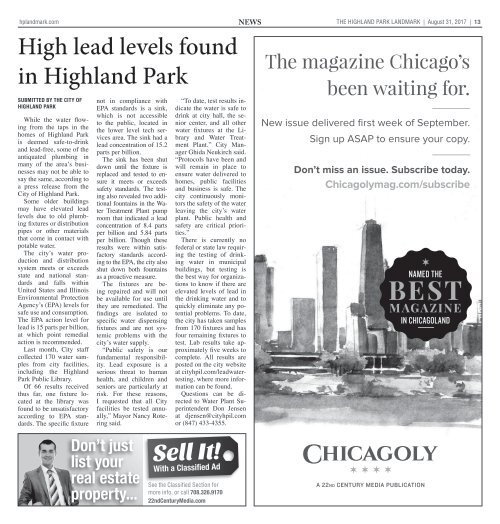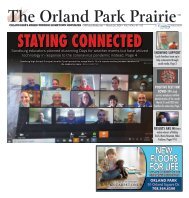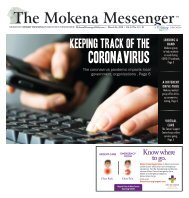Create successful ePaper yourself
Turn your PDF publications into a flip-book with our unique Google optimized e-Paper software.
hplandmark.com news<br />
the highland park landmark | August 31, 2017 | 13<br />
High lead levels found<br />
in Highland Park<br />
submitted by the city of<br />
highland park<br />
While the water flowing<br />
from the taps in the<br />
homes of Highland Park<br />
is deemed safe-to-drink<br />
and lead-free, some of the<br />
antiquated plumbing in<br />
many of the area’s businesses<br />
may not be able to<br />
say the same, according to<br />
a press release from the<br />
City of Highland Park.<br />
Some older buildings<br />
may have elevated lead<br />
levels due to old plumbing<br />
fixtures or distribution<br />
pipes or other materials<br />
that come in contact with<br />
potable water.<br />
The city’s water production<br />
and distribution<br />
system meets or exceeds<br />
state and national standards<br />
and falls within<br />
United States and Illinois<br />
Environmental Protection<br />
Agency’s (EPA) levels for<br />
safe use and consumption.<br />
The EPA action level for<br />
lead is 15 parts per billion,<br />
at which point remedial<br />
action is recommended.<br />
Last month, City staff<br />
collected 170 water samples<br />
from city facilities,<br />
including the Highland<br />
Park Public Library.<br />
Of 66 results received<br />
thus far, one fixture located<br />
at the library was<br />
found to be unsatisfactory<br />
according to EPA standards.<br />
The specific fixture<br />
not in compliance with<br />
EPA standards is a sink,<br />
which is not accessible<br />
to the public, located in<br />
the lower level tech services<br />
area. The sink had a<br />
lead concentration of 15.2<br />
parts per billion.<br />
The sink has been shut<br />
down until the fixture is<br />
replaced and tested to ensure<br />
it meets or exceeds<br />
safety standards. The testing<br />
also revealed two additional<br />
fountains in the Water<br />
Treatment Plant pump<br />
room that indicated a lead<br />
concentration of 8.4 parts<br />
per billion and 5.84 parts<br />
per billion. Though these<br />
results were within satisfactory<br />
standards according<br />
to the EPA, the city also<br />
shut down both fountains<br />
as a proactive measure.<br />
The fixtures are being<br />
repaired and will not<br />
be available for use until<br />
they are remediated. The<br />
findings are isolated to<br />
specific water dispensing<br />
fixtures and are not systemic<br />
problems with the<br />
city’s water supply.<br />
“Public safety is our<br />
fundamental responsibility.<br />
Lead exposure is a<br />
serious threat to human<br />
health, and children and<br />
seniors are particularly at<br />
risk. For these reasons,<br />
I requested that all City<br />
facilities be tested annually,”<br />
Mayor Nancy Rotering<br />
said.<br />
Don’t just<br />
list your<br />
real estate<br />
property...<br />
“To date, test results indicate<br />
the water is safe to<br />
drink at city hall, the senior<br />
center, and all other<br />
water fixtures at the Library<br />
and Water Treatment<br />
Plant.” City Manager<br />
Ghida Neukirch said.<br />
“Protocols have been and<br />
will remain in place to<br />
ensure water delivered to<br />
homes, public facilities<br />
and business is safe. The<br />
city continuously monitors<br />
the safety of the water<br />
leaving the city’s water<br />
plant. Public health and<br />
safety are critical priorities.”<br />
There is currently no<br />
federal or state law requiring<br />
the testing of drinking<br />
water in municipal<br />
buildings, but testing is<br />
the best way for organizations<br />
to know if there are<br />
elevated levels of lead in<br />
the drinking water and to<br />
quickly eliminate any potential<br />
problems. To date,<br />
the city has taken samples<br />
from 170 fixtures and has<br />
four remaining fixtures to<br />
test. Lab results take approximately<br />
five weeks to<br />
complete. All results are<br />
posted on the city website<br />
at cityhpil.com/leadwatertesting,<br />
where more information<br />
can be found.<br />
Questions can be directed<br />
to Water Plant Superintendent<br />
Don Jensen<br />
at djensen@cityhpil.com<br />
or (847) 433-4355.<br />
Sell It!<br />
With a Classified Ad<br />
See the Classified Section for<br />
more info, or call 708.326.9170<br />
22ndCenturyMedia.com<br />
The magazine Chicago’s<br />
been waiting for.<br />
New issue delivered first week of September.<br />
Sign up ASAP to ensure your copy.<br />
Don’t miss an issue. Subscribe today.<br />
Chicagolymag.com/subscribe<br />
A 22ND CENTURY MEDIA PUBLICATION<br />
NAMED THE<br />
BEST<br />
MAGAZINE<br />
IN CHICAGOLAND


















